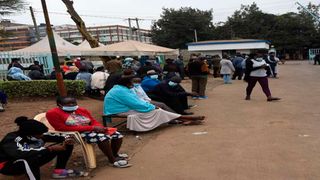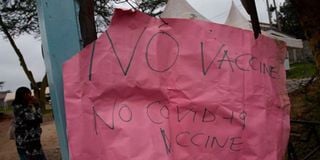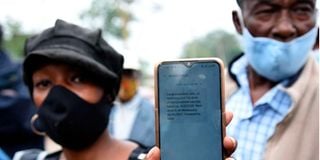
Members of the public wait to receive their second doses of the Covid-19 vaccine at Mbagathi hospital in Nairobi on June 17, 2021.
| Evans Habil | Nation Media GroupNews
Premium
Kenya likely to miss vaccination target of citizens by September
What you need to know:
- The World Health Organizaton has warned that 47 out of 54 countries including Kenya are set to miss the September target of vaccinating 10 per cent of their populations
When she drove into Mbagathi Hospital on Thursday morning, Barbara Nel, AstraZeneca’s Country President for the African Cluster, saw dozens of Kenyans were already in the queue waiting for the vaccine. However, at the gate, there was a notice indicating that there was no vaccine.
“This touched me, I saw an eager Kenyan, an African, who really want to protect him/herself yet the vaccines were not available, and this is the critical time that all African countries need to come together. Together, we shall win,” she said.
The World Health Organizaton has warned that 47 out of 54 countries including Kenya are set to miss the September target of vaccinating 10 per cent of their populations unless Africa receives 225 million more doses.

A 'No Covid 19-vaccine' notice is pictured at Mbagathi hospital in Nairobi on June 17, 2021.
The shortage is holding back the rollout of second doses of the Covid-19 vaccine in most countries. Only seven countries in Africa are set to meet the target
In Kenya, over 1.2 million doses of vaccines have been administered across the country with about 991,184 Kenyans getting their first dose while 164,561 are fully vaccinated. Kenya had also received 100,000 donations of AstraZeneca from India, 72,000 from South Sudan The latter two returned their doses to Covax facility after running into problems beating the expiry deadlines in their countries.
The country is also expecting an additional 358,000 doses of AstraZeneca vaccine next week from Denmark government to boost its second round of inoculation amid the shortage of jabs. However, with the donation, more people have surpassed the 12 weeks timing and they are worried whether getting the second dose will be a possibility in the coming months

Judy Garhecha displays a message she received regarding the date for receiving her second dose of the Covid-19 vaccine at Mbagathi hospital in Nairobi on June 17, 2021.
Saturday Nation Health reporter Angela Oketch interviewed Nel on AstraZeneca, when the vaccine will be available in Kenya and other issues. Below are excerpts.
Are we likely to extend the dosing intervals that has currently been adopted by Kenya to more than 12 weeks?
At the moment, Oxford University is working on the data to see whether we can extend the waiting period. However, regulatory authorities in Spain and Canada have already made the decision to extend the dosing intervals to more than 12 weeks.
We will follow the science, be patient and provide the information when necessary to the government of Kenya.
Do you support the possibility of a vaccine mix now that countries including Kenya are experiencing shortage, are the ongoing studies on the possibility?
Once again, we have to follow evidence-based science. Currently, the data states that if you got the AstraZeneca vaccine as your first dose, then that’s what you should get for the second dose.
However, there are a lot of ongoing studies looking at vaccine mixes and in the next couple of months, we should probably have evidence around that.
What’s the arrangement between Covax and AstraZeneca in ensuring that countries have surplus of the vaccine?
At the moment, countries are supplied with vaccines through Covax, depending on the severity of the disease, the number of people vaccinated and the caseload. Covax then decides the quantity to be supplied.
Ms Barbara Nel, AstraZeneca’s Country President for the African Cluster, in Mombasa on June 18, 2021.
Covax depends on Serum Institute of India as the trusted partner for the supply of the AstraZeneca vaccine. However, with the devastating second wave, they are no longer exporting. Kenyans are suffering. What’s the way forward?
They have committed in writing that as soon as the numbers go down and the situation improves, the export will happen again. What we are doing at the moment, and because the situation is quite critical in Africa, we are now working closely with countries that have high quantities of vaccines to donate, to serve as a bridge for the situation at hand.
We are seeing more countries making donations to Kenya, Rwanda and Senegal. We are expecting more donations to Kenya from European countries in the coming weeks.
AstraZeneca is considered a number one option vaccine for many African countries, however, we are seeing a number of new variants which are not easily tamed by the vaccine, are there ongoing research to make it better to be able to tame the new variants?
The big variant of concern in Africa is the Indian one (Delta). The variant has been reported in almost 27 African countries including Kenya.
It is the variant that has been linked to a rise in Covid-9 cases in Kenya and Uganda. The variant was first reported in India and is spreading fast and emerging as the predominant variant driving the third wave in most countries, including Kenya.
Earlier this week, data from public health inland, looking at the data of patients being vaccinated in the UK, shows that the vaccine provides 92 per cent protection against hospitalisation for people exposed to the Delta variant. This is encouraging and it is good that more data is being developed.
In collaboration with Oxford University, we are working on a vaccine specifically targeting some of the variants of concern to ensure strong protection.
Can you assure the 1.2 million Kenyans who got their first dose of AstraZeneca that they will fully be vaccinated with the same vaccine?
For up to 12 weeks, the vaccine provides 100 per cent protection against severe disease. We are working with Oxford University on longer timeliness in times of gaps between the first and the second dose.
Three weeks ago, we didn’t know countries could donate doses but they now are. Before the end of June, more vaccines will have been donated. I am in talks with many countries to donate in good time to ensure second doses are flowing into the country.
We have seen a breakthrough in the last weeks and are yet to see more. Everyone who got the first dose will definitely get the second one.
You last assurance to Kenyans eagerly waiting for the vaccine?
I am confident that we will ensure the right number of doses is brought to Kenya and become available, and that the Serum Institute will be back soon.
What’s the situation in Africa? What’s the backlog?
In all the African countries, 94 per cent of the doses that have gone into the Covax facility have been AstraZeneca. We have supplied 77 million doses to low and middle income countries, with 38 countries from Africa benefiting from AstraZeneca vaccine.
Due to the devastating second wave currently being experienced in India, supply of the vaccine in Africa has reached a critical point. This is the time to work harder than ever to liaise with different countries and urge them to donate vaccines to needy ones.
Many countries have now pledged an additional $2.4 billion to Covax, which means the facility has 1.8 billion fully funded doses to supply to low income countries in 2021 and into 2022. We need to work together to ensure countries such as Kenya and other African nations get the vaccines they need. We still need over 200 million doses
Are you in support of the patent waiver protections for Covid-19 vaccines?
Our approach with AstraZeneca is to come up with a nonprofit price that drives broad equitable access. Secondly, we have a global supply chain, working with partners on a full technology transfer, for them to be able to make the vaccine.
Sometimes a technology transfer can take months to be completed yet with Covid-19, speed is of the essence. So for us, it is all about how we can get the right quantity of vaccines into countries as fast as possible.





